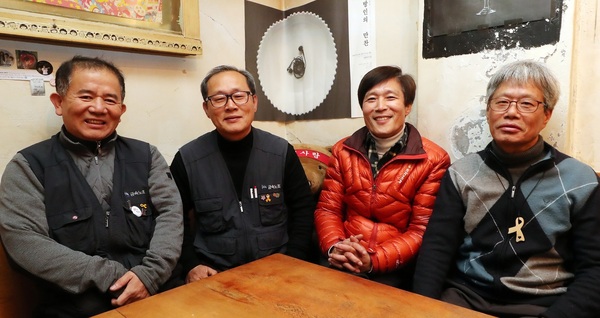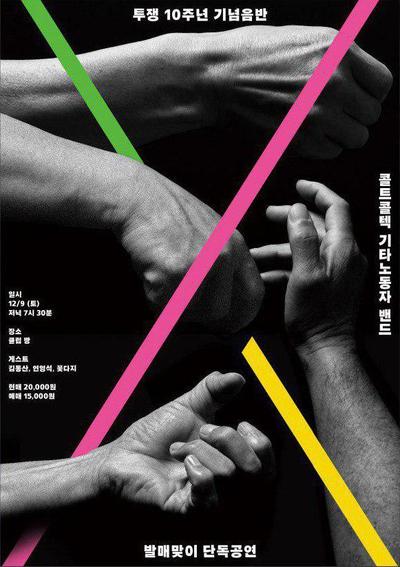 |
|
Members of the Cort Guitar Workers’ Band talk about their 10th anniversary during an interview with the Hankyoreh at a coffeseshop in the Hondae area of Seoul on Dec. 10. From left are Bang jong-woon (leader of the Cort labor union), Kim Gyeong-bong (electric bass), Lee Ing-geun (vocals/guitar), and Lim Jae-chun (cajón). (by Kim Hak-seon, music critic)
|
Employees of the world famous guitar manufacturing company formed a band to publicize their battle with management
It`s hard to imagine a 10-year anniversary that is less fun to celebrate. The Cort Guitar Workers’ Band, called “Cort-Band” for short, released an album to commemorate the 10th anniversary of their struggle to be reinstated at their jobs. There are three musicians in the band: Lee In-geun on vocals and guitar, Kim Gyeong-bong on the electric bass and Lim Jae-chun on the cajón, a box-shaped drum. In April 2007, Cort laid off 56 workers at its factory in Bupyeong, Incheon; that July, it shut down a factory in Gyeryong, Daejeon, firing 65 workers; and in 2008, it closed the Bupyeong factory and let the remaining 125 workers go. When these workers decided to fight their one-sided termination, none of them could have dreamed that their fight would last more than 10 years. So much time has passed that they now joke that as soon as they return to their jobs, it will be time to retire. Cort Guitars (also known as Cor-Tek) was established with 2 million won of capital in the Seongsu neighborhood of Seoul in 1973, and since then it has grown into a massive company that controls a 30% share of the global guitar manufacturing market. But this growth came at workers’ expense. Employees frequently worked overtime without any extra pay in inhumane conditions – the windows were removed because of concerns that productivity would decrease if workers could look out the windows. This made the company owner, Park Young-ho, one of the 120 richest people in Korea. But he arbitrarily closed his South Korean factories and set up factories in China and Indonesia in order to produce guitars for cheaper wages. The workers at Cort did everything in their power to resist the layoff and the closing of their workplace. Despite a wide range of protests – including two aerial sit-ins and hunger strikes, a self-immolation, an ongoing relay-style sit-in and hunger strike organized with the help of supportive citizens, protests overseas, the production of a documentary film and the publication of a book – the Cort corporate headquarters and Park himself remain intransigent. The Cort-Band was born as one such form of protest. A 2011 screening of the documentary “Dream Factory” (directed by Kim Sung-kyun, the film tells the story of the Cort workers) featured a congratulatory performance by the ska band Kingston Rudieska. After the concert, the band’s manager, Han Guk-jin, gave the workers a half-serious talking to: “What have you been doing for the past five years? If you had learned an instrument and shared your story through music, wouldn’t it have been a little easier to get your message across to the public?”
 |
|
Cort-Band’s album commemorating their first performance at Café Bbang was showcased on Dec. 9.
|







